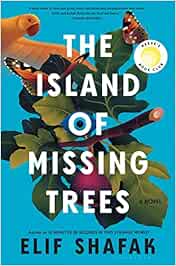4 Stars
This book, part of which is narrated by a fig tree, is a delightful, enriching read.
Ada Kazantzakis, a teenager living in London around 2016, is grieving the death of her mother. She has no connection to her parents’ homeland of Cyprus except for a transplanted fig tree which grows in the garden. The unexpected arrival of a visitor from that island helps Ada untangle the secrets of her family’s troubled history about which she knows little. She learns about the forbidden love between her parents, Kostas - a Greek Christian Cypriot and Defne - a Turkish Muslim Cypriot, and the ethnic, religious and political unrest that engulfed Cyprus in the mid-1970s.
Almost half the novel is narrated in first person by a fig tree. Initially, I was skeptical about the use of an arboreal narrator, but I came to enjoy many of those chapters - though I was irked by some sections where an ant or a mosquito serve as too convenient sources of information for the tree. Certainly, the tree has personality traits; she is chatty (a bit of a gossip), opinionated (commenting on a wide variety of topics), and proud (arguing that fig trees are much better than carob trees). She possesses a sense of humour (insisting that Adam and Eve yielded to the allure of a luscious fig not a plain old crunchy apple), but can also be didactic (“the climbing wood vine Boquila trifoliolata can alter its leaves to mimic the shape or colour of those of its supporting plant”) and moralistic (“Even trees of different species show solidarity with one another regardless of their differences, which is more than you can say for so many humans”). She certainly teaches a lot about trees and other flora. After reading that “the smell of a freshly mown lawn, that scent humans associate with cleanliness and restoration and all things new and zestful, is in fact another distress signal issued by grass to warn other flora and ask for help,” I will feel guilty whenever I mow grass. She also instructs about fauna like birds, bats, ants, butterflies, honeybees, and mice. Certainly, the surprise twist at the end inspired me to set aside any prejudice against talking trees.
I loved the fig tree’s more philosophical, meditative moments: “Humans care more about the fate of animals they consider cute” and “that is what migrations and relocations do to us: when you leave your home for unknown shores, you don’t simply carry on as before; a part of you dies inside so that another part can start all over again” and “I think of fanaticism – of any type – as a viral disease. Creeping in menacingly, ticking like a pendulum clock that never winds down, it takes hold of you faster when you are part of an enclosed, homogenous unit” and “Truth is a rhizome – an underground plant stem with lateral shoots. You need to dig deep to reach it and, once unearthed, you have to treat it with respect.”
The novel is a commentary on the effects of war: loss, displacement, and migration. Defne never fully recovered from the violence of her native country. Sometimes the effects are multi-generational. Defne and Kostas agreed not to burden Ada with knowledge of their past, but the lack of extended family concerns her as does her parents’ silence about their pasts. She believes that “she carried within a sadness that was not quite her own.” The fig tree emphasizes that war also has effects on the natural world: “But on an island plagued by years of ethnic violence and brutal atrocities, humans were not the only ones that suffered. So did we trees – and animals, too, experienced hardship and pain as their habitats came to disappear.” The message is that “wherever there is war and a painful partition, there will be no winners, humans or otherwise.”
The vivid descriptions of Cyprus’s landscape left me wanting to visit. Though the island may not be what it once was. When Kostas visits after 25 years, he finds it is not “the verdant paradise he remembered. Cyprus was known in antiquity as ‘the green island’, famous for its dense, mysterious forests. The absence of trees was a powerful rebuke to the dreadful mistakes of the past.”
I highly recommend this novel. Written in elegant prose, it is both emotionally arousing and thought-provoking. It reminds us that we cannot ever fully escape the past (“’you break free and travel as far as you can, then one day you look back and realize it was coming with you all along, like a shadow’”) and that we can learn a great deal from the natural world in which “everything is interconnected.”

No comments:
Post a Comment